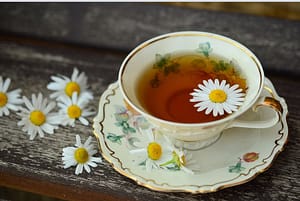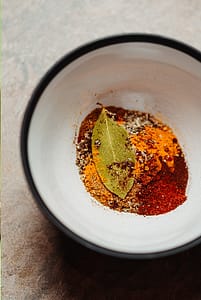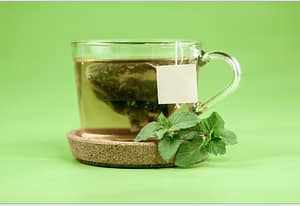[grwebform url=”https://app.getresponse.com/view_webform_v2.js?u=wfNAY&webforms_id=57753701″ css=”on” center=”off” center_margin=”200″/]
What Foods Help With Anxiety
We want to share what foods help with anxiety, because we all suffer from anxiety on occasion.
Yes there are some lifestyle adjustments you can make to help you deal with your stress and anxiety overload. You may be aware that getting enough rest and doing some exercise can support your health. But did you know that the foods you eat can have a significant impact on lowering or raising your anxiety? Yes, avoiding stimulants like caffeine and making sure you eat plenty of fresh fruits and vegetables will help. However, studies have shown that some super foods will help to improve your mood and help you manage your anxiety better.
Here are the top five foods recommended by scientists to help lower your anxiety.
Chamomile
 Chamomile has been used to treat various ailments since ancient times, and its calming properties are well-known. Research into the science of chamomile and its effects on stress has revealed much. This herb is indeed a natural remedy for reducing stress levels.
Chamomile has been used to treat various ailments since ancient times, and its calming properties are well-known. Research into the science of chamomile and its effects on stress has revealed much. This herb is indeed a natural remedy for reducing stress levels.
Chamomile contains several compounds such as apigenin that have been studied for their potential anti-anxiety properties. It also contains antioxidants which can help to protect against oxidative damage caused by chronic stress. Studies have found that taking chamomile significantly reduces cortisol levels. Lower cortisol is an indicator of reduced stress in the body. Additionally, two of the main components of chamomile—alpha-bisabolol and levomenol—have been shown to reduce anxiety levels in animal studies. Chamomile is full of relaxant flavonoids, antioxidants, and anti-inflammatories which reduce anxiety symptoms. Try drinking chamomile tea regularly as part of your anxiety management program.
In addition to these pharmacological benefits, consuming chamomile tea regularly can provide psychological benefits as well.
Herbalists have known about chamomile’s soothing qualities for centuries, and now science can tell us why. Try drinking chamomile tea regularly as part of your anxiety management program.
Turmeric

The active ingredient in turmeric is curcumin – a powerful antioxidant with anti-inflammatory properties – which is largely responsible for its medicinal benefits. Studies have demonstrated that curcumin can reduce oxidative damage and inhibit the release of corticosterone. It is a hormone linked to chronic stress.. Additionally, curcumin helps to modulate neurotransmitters responsible for regulating our moods such as serotonin and dopamine.
Curcumin also increases omega-3 fatty acids in the brain. They play an essential role in regulating the “happy hormones” dopamine and serotonin.
Green tea

The active ingredient in green tea that is responsible for its calming effects is an amino acid called L-theanine. When combined with caffeine, which is also found in green tea, it helps create a relaxing effect without causing drowsiness. This combination helps enhance mental alertness while providing a feeling of well-being and relaxation. Studies have also shown that consuming green tea regularly can help balance the activity of neurotransmitters involved in regulating moods such as serotonin and dopamine.
Drinking green tea is not just an excellent alternative to caffeine-heavy coffee and black tea, but it’s also packed full of the elements as described above. If you want to relax and give your body an anti-oxidant cleaning, green tea is for you. Plus, I think it tastes great!
Click here to read an article by the National Library of Medicine about green tea.
Oily fish

Eating oily fish like salmon and tuna may be beneficial for lowering stress levels. Research shows that these omega-3s can help reduce symptoms associated with mild depression and anxiety, both of which contribute to stress.
Consuming more fatty fish in one’s diet has been linked to increased serotonin production, decreased cortisol levels, and improved moods. Serotonin is a neurotransmitter responsible for regulating mood while cortisol is the hormone released during times of stress. Eating more oily fish could lead to better control over emotions by balancing out these hormones in the body.
Click here to read an article in Science Daily about benefits of eating oily fish.
Yogurt

Eating yogurt may be one of the simplest yet most efficient ways to lower stress. Recent studies have shown that yogurt can act as a powerful ally against anxiety, and its effects are easily obtainable by regular consumption of this natural food.
Yogurt contains beneficial bacteria which have been scientifically proven to reduce the amount of cortisol, a hormone regularly released during times of stress. High cortisol levels in the body often lead to an array of physical and psychological ailments such as migraines, depression, weight gain and immune system impairment. Eating yogurt can help decrease these levels considerably while simultaneously providing essential nutrients such as calcium, protein, B vitamins and probiotics which promote healthy digestion.
Though other foods such as nuts and dark chocolate contain similar stress-lowering benefits, it is hard to beat the convenience that yogurt offers due to its availability in stores all over the world.
Studies on yogurt and anxiety have shown that daily yogurt consumption can make people more stress resilient, reduce anxiety and encourage better brain function in the parts of the brain that control emotion and sensation. Eat more yogurt the non sweetened variety, please !
Click here to read an article from abp Live about yogurt.
Going Forward, with Less Stress
A diet that includes yogurt, oily fish, green tea, chamomile and turmeric can significantly reduce one’s stress levels. These foods are rich in ingredients that support the body’s natural ability to manage stress. They possess natural properties that can help to relax the mind and body and are also rich in essential vitamins and minerals. Regular consumption of these foods has been proven to reduce instances of stress-related illnesses and promote overall wellbeing. Therefore, it is wise to include them in your diet if you wish to improve your mental and physical health.
This article has provided clear evidence of how these foods can make a positive difference in one’s life with regards to reducing overall stress levels. Eating a well-balanced diet that includes these foods on a regular basis is an easy way to help manage stress and promote better overall mental health.
Make an effort to incorporate these stress busters into your life. It won’t be hard to do, and you will reap the benefits.
[grwebform url=”https://app.getresponse.com/view_webform_v2.js?u=wfNAY&webforms_id=63128901″ css=”on” center=”off” center_margin=”200″/]

